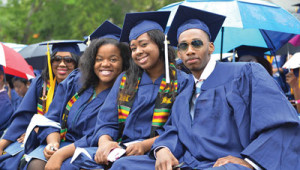
HBCU’s generate $14.8 Billion in Economic Impact
By Stacy M. Brown (NNPA Newswire Contributor)
Historically Black Colleges and Universities (HBCUs) generate $14.8 billion in economic impact annually, according to a stunning new report by the United Negro College Fund (UNCF).
The landmark study titled, “HBCUs Make America Strong: The Positive Economic Impact of Historically Black Colleges and Universities,” said that public HBCUs account for $9.6 billion of that total economic impact, while private HBCUs account for $5.2 billion.
“The estimate includes direct spending by HBCUs on faculty, employees, academic programs and operations, and by students attending the institutions, as well as the follow-on effects of that spending,” the report said.
The combined economic impact is equivalent to a top 200 ranking on the Fortune 500 list of America’s largest corporations.
“The presence of an HBCU means a boost to economic activity, on and off—and even well beyond—campus. Stronger growth, stronger communities, more jobs and a more talented workforce,” UNCF authors wrote in the report.
Fact sheets for the economic impact of individual HBCUs are available at https://www.uncf.org/programs/hbcu-impact.
According to the UNCF report, Howard University generates $1.5 billion in total economic impact and 9,591 jobs for its local and regional economies.
“Every dollar spent by Howard University and its students produces positive economic benefits, generating $1.58 in initial and subsequent spending for its local and regional economies.
The study, conducted by the University of Georgia’s Terry College of Business Selig Center for Economic Growth, found that Hampton University generated $270 million in total economic impact and 2,249 jobs for its local and regional economies.
“For each job created on campus, another 1.7 public- and private-sector jobs are created off campus because of Hampton University-related spending,” study said. “Looked at in a different way: Each $1 million initially spent by Hampton University and its students creates 11 jobs.”
While Morehouse College generated a total economic impact of $188 Million and 1,580 jobs. Spelman College accounted for $199 million in total economic impact and 1,625 Jobs.
North Carolina A&T State University generated $488 million in total economic impact and 4,325 jobs for its local and regional economies.
“It’s the first time that we’ve had a study conducted by such a professional institution to recognize the importance of HBCUs and particularly the impact on our community,” Miles College President Dr. George T. French, Jr., told the NNPA Newswire. “We’ve talked in general terms, but to quantify this is important so that our partners can understand the value of our institution. It’s a win-win for our region and for government partners who look to partner with us.”
The report revealed that the 1,634-student Alabama school generated $67 million for its local region. Each $1 million initially spent by Miles College and its students creates 16 jobs, according to the report.
“It’s eye-opening and, in addition to the 730 jobs created, there’s a 1-to-1 match for every full-time job at Miles, we create another job in our region,” French said. “So, we have about 377 employees on campus, but because of that, we’ve created 350 off-campus jobs.”
The benefits flow to Miles College’s graduates, who’ll enter the workforce with sharper skills and vastly enhanced earning prospects, according to the report.
As an example, the 196 Miles College graduates from 2014 can expect total earnings of $497 million over their lifetimes—a stunning 77 percent more than they could expect to earn without their college credentials.
“What you’re looking at is, when you round it to 200 students, they already have over $2 million more in earning potential in their careers which increases by $1.1 million, because of having a degree from Miles College,” French said. “I think it’s important to have this conversation for young people, who must decide if college is worth it. At the end of the day, it’s a great economic decision.”
The figures also allow college officials to approach state and local government officials, when funding for recruitment and other programs are needed, French said.
French said, adding that because of the report he believes the city will be even more cooperative with Miles College.
“With this study, we can go to the government and say we need additional money for cutting-edge programs and recruitment,” he said. “We’ve requested and will have a meeting with the city to compare our master plan with what the city is doing. Here we are, this economic engine with a $52 million annual budget and we can help this city with its master planning and their master plan may intersect with what we’re doing.”

